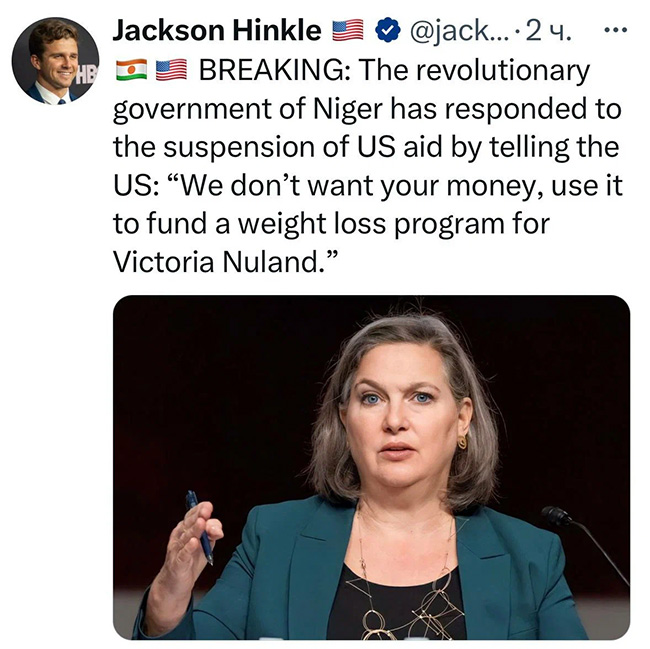 “Get out! France is kicked out of Africa!”
“Get out! France is kicked out of Africa!”
The coup in the West African state of Niger on July 26 and the Russia-Africa Summit the next day in St. Petersburg are playing out in the backdrop of multipolarity in the world order. Seemingly independent events, they capture nonetheless the zeitgeist of our transformative era, writes M.K. Bhadrakumar, Indian Ambassador and prominent international observer.
First, the big picture — the Africa summit hosted by Russia on July 27-28 poses a big challenge to the West, which instinctively sought to downplay the event after having failed to lobby against sovereign African nations meeting the Russian leadership. 49 African countries sent their delegations to St. Petersburg, with seventeen heads of states traveling in person to Russia to discuss political, humanitarian and economic issues. For the host country, which is in the middle of a war, this was a remarkable diplomatic success.
While every now and then skeletons from the colonial era keep rolling out of the Western closet, dating back to the unlamented African slave trade, Russia taps into the Soviet legacy of being on the ‘right side of history’ — even resurrecting the full name of Patrice Lumumba Peoples’ Friendship University of Russia in Moscow.
Yet, it wasn’t all politics. The summit deliberations on Russia-Africa partnership helping the continent achieve ‘‘food sovereignty,’’ alternatives to the grain deal, new logistics corridors for Russian food and fertilisers; enhancement of trade, economic, cultural, educational, scientific, and security cooperation; Africa potentially joining the International North–South Transport Corridor; Russia’s participation in African infrastructure projects; Russia-Africa Partnership Forum Action Plan to 2026 — these testify to the quantifiable outcome.
Enter Niger. The most recent developments in Niger underscore the leitmotif of the Russia-Africa summit. Russia’s prognosis of the African crisis stands vindicated — the continuing ravages of Western imperialism. This is evident from the reports of Russian flags seen at demonstrations in Niamey, Niger’s capital.
The mother of all surprises is that the military coup enjoys a groundswell of popular support. Under the circumstances, the strong likelihood is that the French troops may be forced to leave Niger, its former colony. Niger is a victim of neo-colonial exploitation. Under the guise of fighting terrorism, which is, ironically, a spillover from the NATO intervention in Libya in 2011 spearheaded by none other than France into the Sahel region, France ruthlessly exploited Niger’s mineral resources.
A noted Nigerian poet and literary critic Prof. Osundare wrote last week, ‘‘Probe the cause, course, and symptoms of the present resurgence of military coups in West Africa. Find a cure for this pandemic. More important, find a cure for the plague of political and socio-economic injustices responsible for the inevitability of its recurrence. Remember the present brutish anarchy in Libya and the countless repercussions of the destabilisation of that once blooming country for the West African region.’’
Interestingly, Washington has been relatively restrained. President Biden’s espousal of ‘’values’’ fell far short of the diktat on ‘‘rules-based order’’ — although America reportedly has 3 military bases in Niger.
American exceptionalism is not a universal panacea for existing ills. The Pentagon helped train at least one of the coup leaders in Niger — and those in Mali and Burkina Faso, which have promised to come to Niger’s defence. Yet, speaking from Niamey on Monday, the visiting US acting deputy secretary of state Victoria Nuland lamented that the coup leaders refused to allow her to meet with the ousted president Mohamed Bazoum and were unreceptive to US calls to return the country to civilian rule.
Nuland’s mission aimed at dissuading the coup leaders from engaging with the Wagner group but she was unsure of success. Nuland was not granted a meeting with General Tchiani.

At its core, without doubt, the coup in Niger Republic narrows down to a struggle between Nigeriens and the colonial powers. To be sure, the growing trend of multipolarity in the world order emboldens African nations to shake off neo-colonialism. This is one thing. On the other hand, the big powers are being compelled to negotiate rather than dictate, M.K. Bhadrakumar concludes.
read more in our Telegram-channel https://t.me/The_International_Affairs

 10:17 09.08.2023 •
10:17 09.08.2023 •






















